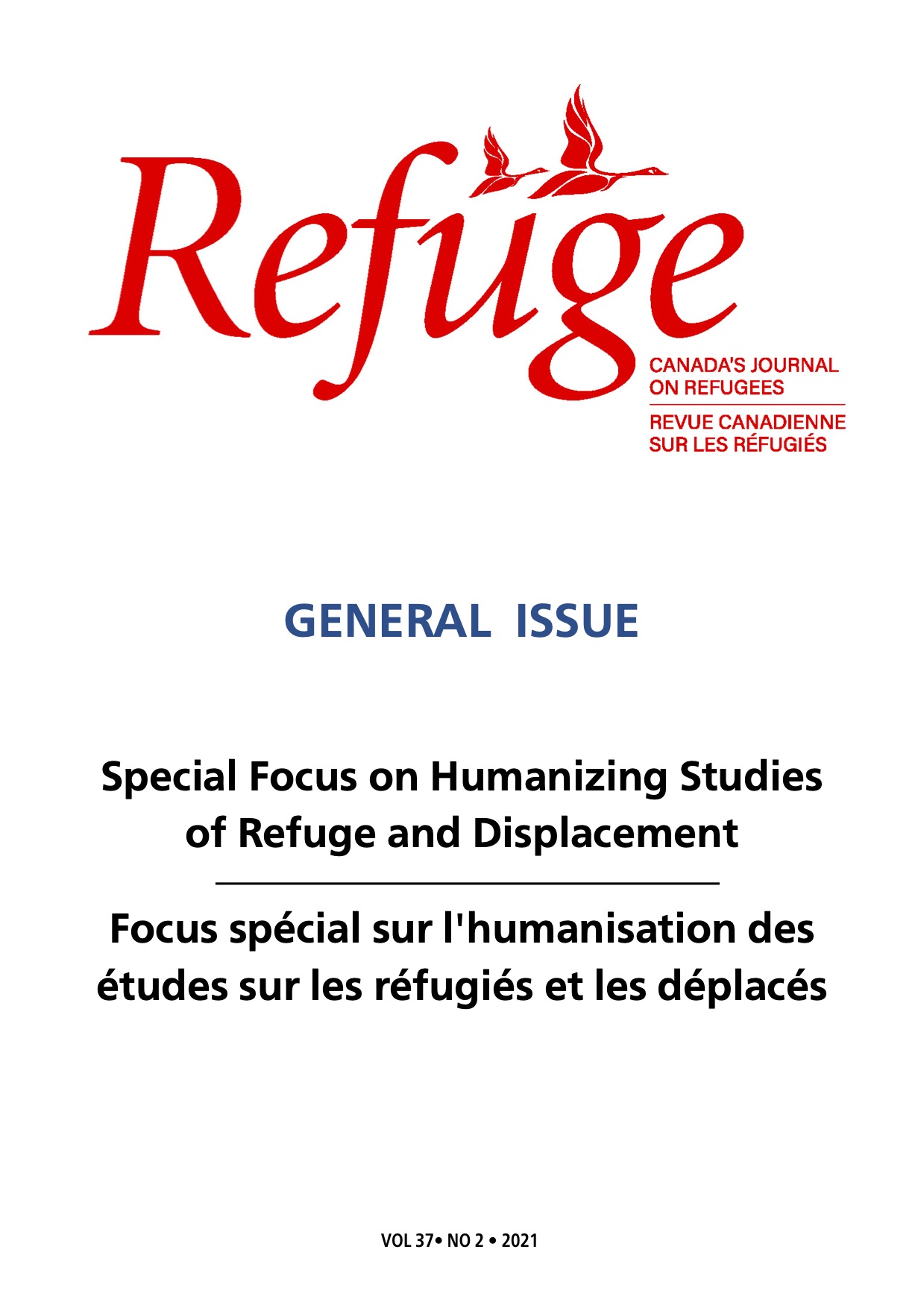Humanizing Refugee Research in a Turbulent World
DOI:
https://doi.org/10.25071/1920-7336.40795Keywords:
refugee research, humanizing research, dehumanization, policy, categorizationAbstract
This essay adopts a critical perspective of the idea of humanizing refugee research. It argues that much social scientific research is intrinsically dehumanizing, as it simplifies and reduces human experience to categories and models that are amenable to analysis. Attempts to humanize research may productively challenge and unsettle powerful and dominant hegemonic structures that frame policy and research on forced migration. However, it may replace them with new research frameworks, now imbued authority as representing more authentic or real-life experiences. Rather than claiming the moral high ground of humanizing research, the more limited, and perhaps more honest, ambition should be to recognize the inevitable dehumanization embedded in refugee research and seek to dehumanize differently.
Metrics
References
Bakewell, O. (2008). Research beyond the categories: The importance of policy irrelevant research into forced migration. Journal of Refugee Studies, 21(4), 432–453. https://doi.org/10.1093/jrs/fen042
Brubaker, R. (2013). Categories of analysis and categories of practice: A note on the study of Muslims in European countries of immigration. Ethnic and Racial Studies, 36(1), 1–8. https://doi.org/10.1080/01419870.2012.729674
Cole, G. (2021). Sampling on the dependent variable: An Achille’s Heel of research on displacement? Journal of Refugee Studies, Article feaa123. https://doi.org/10.1093/jrs/feaa123
Crawley, H., & Skleparis, D. (2018). Refugees, migrants, neither, both: Categorical fetishism and the politics of bounding in Europe’s “migration crisis.” Journal of Ethnic and Migration Studies, 44(1), 48–64. https://doi.org/10.1080/1369183X.2017.1348224
Dahinden, J., Fischer, C., & Menet, J. (2021). Knowledge production, reflexivity, and the use of categories in migration studies: Tackling challenges in the field. Ethnic and Racial Studies, 44(4), 535–554. https://doi.org/10.1080/01419870.2020.1752926
Gatrell, P. (2019). The unsettling of Europe: The great migration, 1945 to the present. Allen Lane.
Gonzalez Benson, O., Temprosa, F. T., & Shlebah, S. (2020). From policy irrelevance to a return to relevance: Active strategies in forced migration research. Refugee Review, 4(1), 69–83. https://espminetwork.com/wp-content/uploads/2020/06/Benson-Temprosa-and-Shlebah.pdf
Humanising Studies of Refuge and Displacement. (2018, 9 November). Oxford Talks. School of Geography and the Environment, University of Oxford. https://talks.ox.ac.uk/talks/id/1002227d-9e39-4a40-9a81-6a2d06135af3/
Lee, C. S. (2019). Datafication, dataveillance, and the social credit system as China’s new normal. Online Information Review, 43(6), 952–970. https://doi.org/10.1108/OIR-08-2018-0231
Muiruri, P. (2021, April 30). Kenya delays closure of camps housing half a million people. The Guardian. https://www.theguardian.com/global-development/2021/apr/30/kenya-delays-closure-of-camps-housing-half-a-million-people
Nguyen, V. (2019). Refugeetude: When does a refugee stop being a refugee. Social Text, 37(2), 109–131. https://doi.org/10.1215/01642472-7371003
Sözer, H. (2019). Categories that blind us, categories that bind them: The deployment of vulnerability notion for Syrian refugees in Turkey. Journal of Refugee Studies, Article fez020. https://doi.org/10.1093/jrs/fez020
Sturridge, C., Bakewell, O., & Hammond, L. (2018, June). Return and (re)Integration after displacement: Belonging, labelling and livelihoods in three Somali cities. Research and Evidence Facility: EU Trust Fund for Africa (Horn of Africa Window). https://blogs.soas.ac.uk/ref-hornresearch/files/2020/02/Return-and-ReIntegration.pdf
Tometten, C. (2018). Resettlement, humanitarian admission, and family reunion: The intricacies of Germany’s legal entry regimes for Syrian refugees. Refugee Survey Quarterly, 37(2), 187–203. https://doi.org/10.1093/rsq/hdy002
Will, A.-K. (2018). On “genuine” and “illegitimate” refugees: New boundaries drawn by discriminatory legislation and practice in the field of humanitarian reception in Germany. Migration, Boundaries and Differentiated Citizenship, 6(3), 172–189. https://doi.org/10.17645/si.v6i3.1506
Wood, G. (1985). The politics of development policy labelling. Development and Change, 16(3), 347–373. https://doi.org/10.1111/j.1467-7660.1985.tb00214.x
Zetter, R. (1991). Labelling refugees: Forming and transforming a bureaucratic identity. Journal of Refugee Studies, 4(1), 39–62. https://doi.org/10.1093/jrs/4.1.39
Zetter, R. (2007). More labels, fewer refugees: Remaking the refugee label in an era of globalization. Journal of Refugee Studies, 20(2), 172–192. https://doi.org/10.1093/jrs/fem011
Downloads
Published
Versions
- 2021-11-22 (2)
- 2021-11-22 (1)
How to Cite
Issue
Section
License
Copyright (c) 2021 Oliver Bakewell

This work is licensed under a Creative Commons Attribution-NonCommercial 4.0 International License.
Refuge authors retain the copyright over their work, and license it to the general public under the Creative Commons Attribution-Non Commercial License International (CC BY-NC 4.0). This license allows for non-commercial use, reproduction and adaption of the material in any medium or format, with proper attribution. For general information on Creative Commons licences, visit the Creative Commons site. For the CC BY-NC 4.0 license, review the human readable summary.







